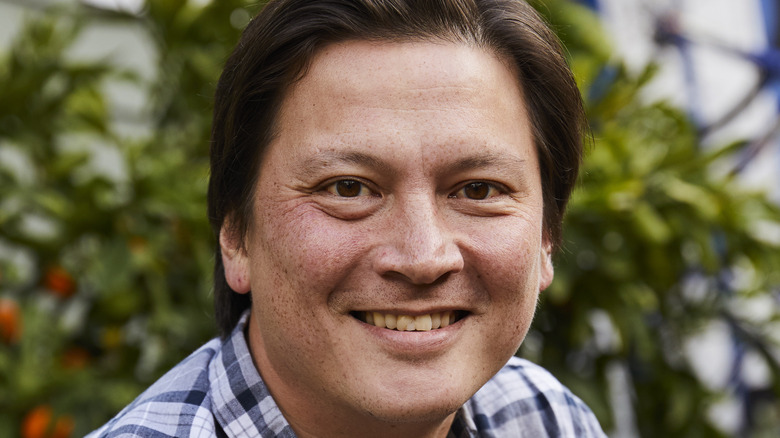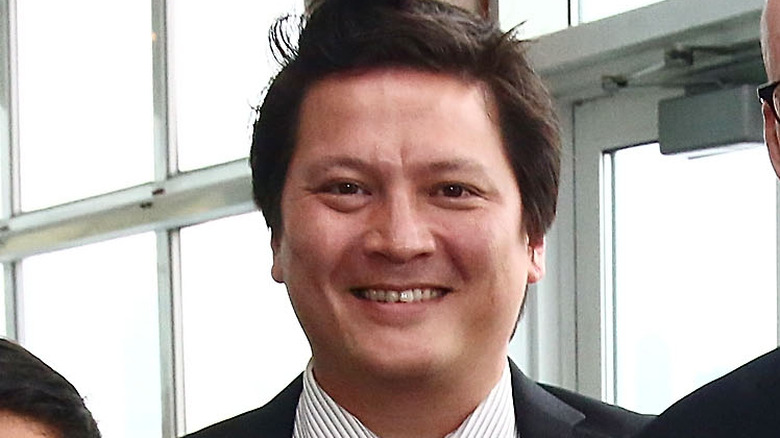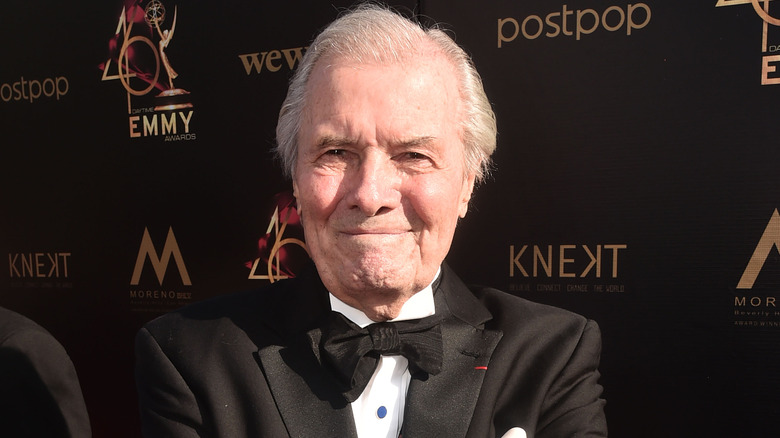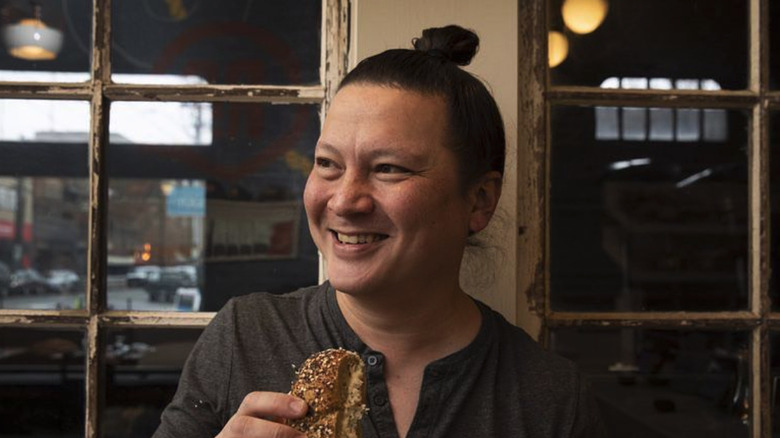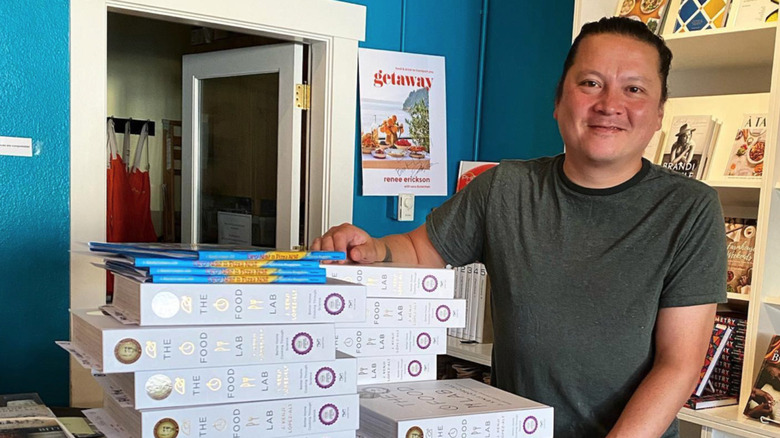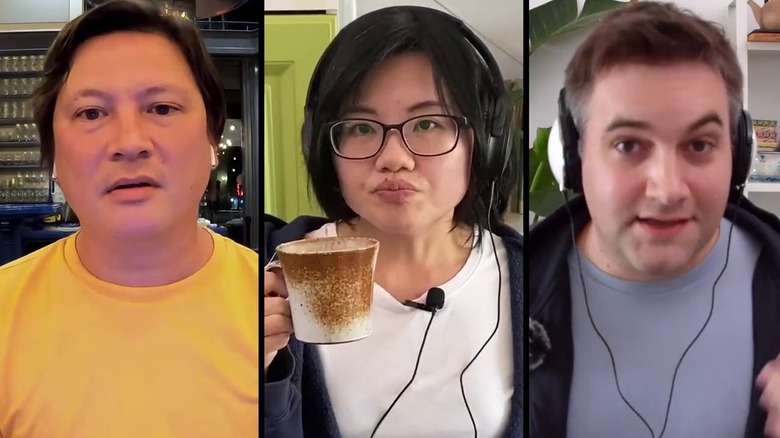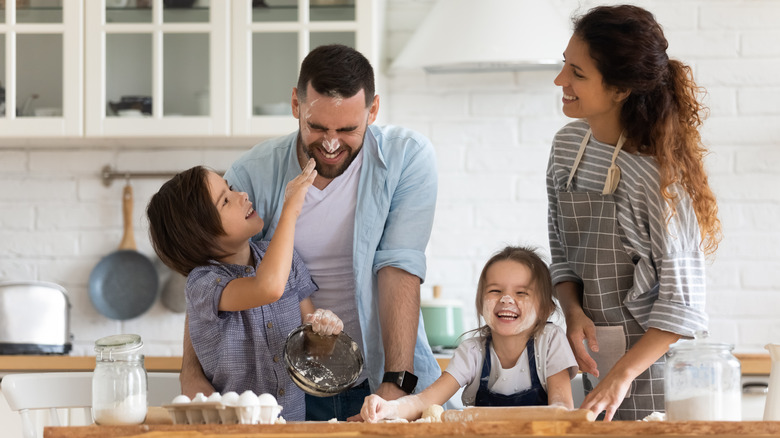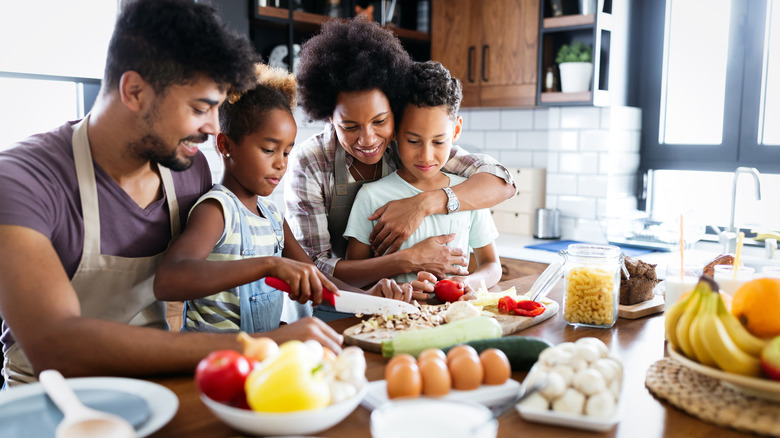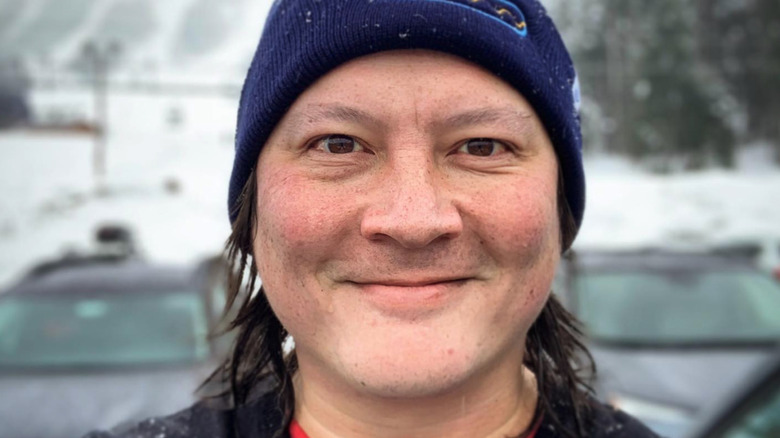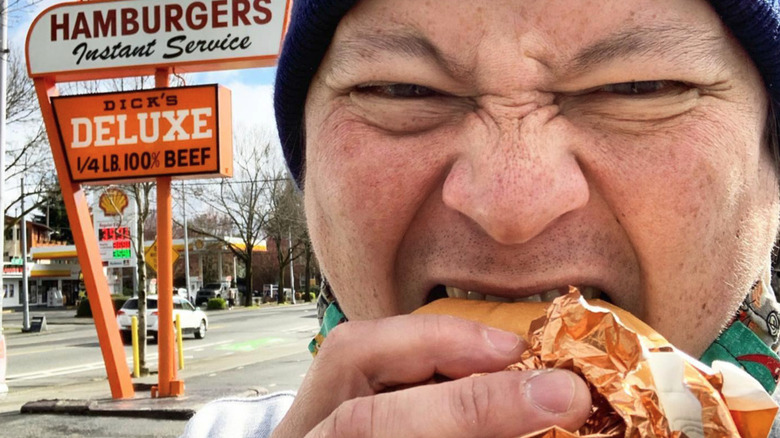Chef And Author J. Kenji Lopez-Alt On Cookbooks, Woks, And A Late Start In The Kitchen - Exclusive Interview
If you're looking for a decidedly nontraditional member of the American culinary scene, you found one in J. Kenji López-Alt. The chef and author, who usually goes by "Kenji," didn't start cooking until college, and despite his skill in the kitchen, he casually relates how he may not be focused on food in a few years if his interests shift, which they often do. For example, while Kenji has another cookbook coming out this year — "The Wok: Recipes and Techniques," to be specific — he also recently wrote a hit children's book called "Every Night Is Pizza Night" and he has found himself strongly drawn in that direction.
For now, Kenji is a culinary minded kind of guy, but it doesn't stop there. He is science-minded, architecturally inclined, interested in involving his kids in the kitchen and exploring cooking techniques both classic and contemporary — from cookbooks by Jacques Pepin to YouTube cooking channels trending today — along with much more. In other words, Kenji's mind is a busy place. His days are busy, too, which is all the more reason we were glad he sat down for an exclusive interview with Mashed wherein we went over everything from his unexpected entrance into the world of food to his casual acceptance that a few years on he may have moved on to novels, robotics, botany, or who knows what.
How Kenji got into cooking
When did your interest in food start?
It wasn't actually until college. I think I'm a rare case where I didn't really have an interest in cooking until after I got my first cooking job, which was in college. Prior to that, I had a little bit of an interest in food, particularly Chinese food and Mexican food [which] were things that my dad loved, so we went looking for great Chinese food and Mexican food around New York when I was growing up. As far as cooking goes, I had no real interest in it. I accidentally got my first cooking job when I was looking for summer work. The summer after my sophomore year of college, I was looking for a job as a server to make some money. One of the restaurants I went to said they had a cook that didn't show up that morning and I could start working as a cook that day for the summer if I wanted to try it. I said "OK," and I ended up loving cooking. I started getting my interest in cooking after I got my first job as a cook.
When did it become clear that your professional life was actually going to be centered around food?
I don't think it ever became [fully like] that. I'm not one of these people that thinks super long-term, as far as career goes. Most of my career decisions have been based around whether I am currently satisfied with the work I'm doing ... and lot of that involves whether I feel like I'm learning and growing and gaining new skills. Basically, my career started after I was working part-time as a cook through college because I enjoyed it. After that, I went full-time into cooking, and then I worked at a number of different restaurants and essentially I left restaurants after I felt like, "OK, I'm in a higher position here now, I enjoy teaching other people, but there's still a lot for me to learn, so I want to move somewhere else where I can learn new styles of cooking and new techniques."
Once I was in the restaurant industry for a while, I thought it would be fun to learn the other side of the industry, the writing and the recipe development and all that. I went into that and that's where I've been. I've been in the recipe writing and recipe testing field now since 2006 or 2007. I've been doing it for 15 years but now I have other interests as well. I could very well see myself in five years doing something completely un-food related. I wrote a children's book last year, I want to write a few more children's books. I've got other interests. I'm not even sure that food is going to be my career for life, but it is my career now.
Kenji's varied culinary influences
Once you found yourself getting into food, who were some of your inspirations and influences?
Certainly Jacques Pépin, I'd say would be my biggest influence. "La Techniques" was one of the first cookbooks I owned. Some of those early Food Network chefs or PBS chefs — I watched a lot of Ming Tsai growing up and in high school, and some Alton Brown. Other than that, previous to them, I always watched a lot of PBS, people like Jacques Pépin and Bob Ross and stuff like that. I grew up watching PBS. Of those, when I was little, the cooking shows were part of that general mix of PBS programming. As I got older, I started reading more of Jacques Pepin's books.
The very first paycheck that I got from my first restaurant job, I used [it] to buy Ming Tsai's book. Those are my earliest influences, [but] I still have stuff in my career that is influenced by them. I always admired [Jacques Pépin] for the manner in which he educates people and his super non-judgmental quality. He's this great French chef, but he still makes food really approachable and understands that people are cooking under different conditions and not everybody needs to make these restaurant style meals at home. I always admired that about him and his educational, easygoing approach.
Ming Tsai [offers] a good understanding of both Eastern and Western cuisines and the mix of them. That's something that I do a lot myself, and then Alton Brown, with the science angle and technique-based angle — those are all things that were very early influences of mine that I think still affect the way I write and the way I think about cooking.
How a family steeped in science influences Kenji's work
How does your family's science background inform your cooking and your thinking about food?
There's a lot of scientists in my family and I grew up surrounded by scientists and people who stress the importance of understanding how things work and testing hypotheses and things like that. It affected the way I think about food in the same way that it affects every aspect of my life. It's part of my language growing up, it was science and this idea that it's not good enough to know how to do something, you want to know why it works and how it works. I was one of those kids that would take the top off the VCR — when VCRs still existed — and poke around all the bits and see how things were connected.
I want to open up the hood and see how the engine works. That was how I was raised and how I always have been around every subject. In the food space, I think I was pretty lucky because I had this background and then I worked in fine dining in a bunch of restaurants and stuff. While there were people like Carol McGee and Alton Brown, there weren't that many people doing what I ended up doing, [where] I considered myself a science writer and science communicator. I'm definitely not a scientist with a capital "S," but there weren't a lot of people who had taken this science-based first principles approach to home cooking in the way that I was able to early in my career and that brought me to where I am today. Now, there are a lot more people who focus on that than there were back then.
An architectural underpinning
How do your own studies in architecture impact your culinary work?
A lot of architecture is thinking about the role of the functionality versus the form of things and [in] a lot of architecture, it's less about, "How do I make this building stand," or "How do I make this building look cool?" It's about the intentionality of purpose. If I know that this space is going to be used in a specific way, I need to design it to work in that space, and a building that works for one client isn't going to work for another and a building that works in one city won't work in another city. A lot of it is about contextualization and understanding that there isn't one "better form" than another, it's really all about text and the parameters within which you're working.
That education has affected my cooking and especially my recipe development, because one trap that, especially, people who have restaurant backgrounds fall into is to think that the way [they] do it in the restaurant is the best way. If I do it this way, it's got to be that way every single time because in restaurants, consistency is really paramount, whereas home cooks, they're working under all different kinds of situations, whether it's financial, the type of kitchen they have, the type equipment they have, their personal tastes, all these different things. My background in architecture has helped in the sense that it's helped me understand that different people have different needs for different things. A recipe that's designed for one person isn't necessarily going to work for another.
When you think about recipes in that way, it really makes you understand that you have to be open to other people's needs. It's also why I focus more on technique as opposed to strict recipes, because a very strict recipe only works if you have this exact ingredient list, you follow these exact sets of instructions and you have this exact equipment. If you understand techniques and you understand why things work together, you become much more adaptable and you understand, "OK, these are the parts of the recipe that are essential, these are the things that I can play around with, or these are the things that I can substitute if I don't have that ingredient." That's the way in which architecture has affected my approach to cooking, to a degree. It's really to recognize the human aspect involved in this built, constructed world.
How Kenji approaches cookbook writing
How do you approach writing a cookbook? How do you choose the theme? How do you select which recipes will be included and those that you're going to have to leave out?
The only way I can put my best work into a project is if it's something I'm really passionate and interested about. My publisher, many times, has been like, "Oh, you should write a book about this!" or other people are like, "You should write about a book about that!" I'm like, "Yeah, I'm sure a book like that would sell but I'm not feeling it right now." It has to be something that I'm super passionate about and what I try and do is find that intersection and the Venn diagram of things that I'm passionate about and things that I think will be useful to other people. I try and find that little sweet spot of intersection.
For something like "The Wok," to me, that was an obvious one because the wok that I have right now that I still cook in, I've been cooking in the same exact wok since college, and I've used it throughout my life, throughout my career. It's by far the most used piece of equipment in my kitchen. Initially, my first cookbook, "The Food Lab," there [weren't] any wok recipes in it. The reason for that was out of sheer length — we had to cut some stuff and we decided to focus more on American and Western techniques. "The Wok" was always something that I've wanted to do. As far as deciding what goes in and what goes out, my approach is very much like, as a writer, designing a cookbook for me is the same way I write articles basically, where I'll write as much as I possibly can and then go back and cut, cut, cut until it's really tight and efficient and works.
My initial draft of "The Food Lab," my first book, was more than twice as long as what ended up being published. With "The Wok," we ended up cutting about 30 to 40% of what was in there. The cutting process, part of it is [only] me, but a lot of it is also working with my editor and getting feedback on what they think is the most compelling stuff in there, what they think would be the most useful. The writing part, it's mainly about my interests and my passions, and then the cutting part is much more thinking about it from the user end and thinking about what is the most useful stuff that's in here.
The chefs Kenji follows today
Who are some other chefs and food writers that you follow?
To be honest, these days, I consume a lot more in video format. As far as writing goes, most of the reading I've been doing for the last couple years has been in the Chinese and East Asian food space because I've been working on this book for so long. In that space, [there's] Grace Young, Fuchsia Dunlop. Brandon Jew just came out with a great cookbook. Super nice guy. Of those, Grace Young and Fuchsia Dunlop are the best resources out there for Chinese cookery aimed at Western audiences. I own every one of both of their books.
What are some of the videos, whether it's a YouTube channel or Food Network media, that you personally consume?
A lot of it is YouTube channels. I love chef Won Gong, who's a chef from Sichuan [and] has a YouTube channel. It's all in Chinese, but many of them have English subtitles if you want to watch them. I like the "Woks of Life." It's a family, a Chinese American family that cooks a lot of Chinese food. I love "Just One Cookbook" [by] Namico Chen, she's a Japanese home cook who has a great Japanese home cooking channel, one of the best resources for Japanese home cooking out there.
Adam Liaw, who is an Australian chef — I think he won "Master Chef Australia" a few years ago, but ... he's Malaysian so he focuses a lot on Malaysian and other types of Asian cuisine. "Chinese Cooking Demystified," they're an American man and a Chinese woman who are married and living in China and they make videos on Chinese home cooking. Those are the ones I watch most regularly.
Introducing kids to the kitchen
What are some good ways to get kids more involved in cooking?
My daughter has been in the kitchen with me since she was literally an infant. My son now is five months old now, and he's in the kitchen with me almost every day. I put him on a little bouncy chair and as I'm cooking, I'll take things and hold them up to his nose, let him smell — I did the same thing with my daughter — and talk to him about what I'm doing and get him used to the smells and the sounds and the sights of the kitchen so that he's comfortable with it growing up.
I think the best thing that you can do for your kids is to get them involved early, and not just [with] busy work. You can tell them, "Hey, we're going to put garlic into this dish," then ask them, "How much garlic do you want to put in? Do you want to do two cloves or three cloves or four cloves?" Then, let them choose and whatever they choose, that's what you use, right? I'll always make them feel like they're involved and that their choices are being heard.
Then you can tell them, "All right, put this in the mortar now. We need the garlic pounded into a paste for this dish." It will take them ten times longer than it takes you to do it, but you can be out there doing other stuff while they're sitting there pounding and kids, they love helping, first of all. Toddlers are made to help. They love doing it. They like to imitate their parents. They want the little mini vacuum cleaner. They want to help you fold laundry. They love doing household chores if they see you doing them.
If you're in the kitchen and you invite your kid to come and help you, I don't know any kid that wouldn't want to help you, and pounding things is a really good task for them. For me, I also take a technique-based approach with my daughter. Early on, [I had] her helping me with things that very little kids can do — smashing things in the mortar and pestle, smashing herbs, pounding garlic, smashing ginger ... if I'm making a mushroom soup or a mushroom stir fry, instead of slicing the mushrooms, I'll put a pile of mushrooms in front of my daughter and tell her to smack them with her hand, and that breaks them into little pieces that you can then sauté.
Kenji explains how he keeps kids interested in cooking
What are the best tools for young chefs to use?
The most useful tool I've found for my daughter is a helper stool. [It's] something that she's had since she could stand, and it gets her up to counter height so that she can stand there right while and look at what I'm doing and help me. That mortar and pestle was her first cooking tool, she still uses it. With a mortar and pestle, even when a kid is one-and-a-half years old, they can do actual work that will end up going into [the dish].
I had a little wooden knife that she used for a while and then a relatively sharp plastic knife. I had her using real metal, my knives — by the time she was around two years old, she was using them. Early on, you have to train them and show them how to hold their hand properly and make sure you go slow and start them with soft foods that don't roll around a lot. My daughter now is almost five, and [while] it's difficult for her to chop a big carrot, for example, you can give her a stick of celery, she'll chop it, you can give her a tomato and she'll chop it.
Don't treat kids like a nuisance in the kitchen. There's ... an urge like, "All right, I've got half an hour to get dinner on the table and if I invite my toddler to come in here and help, that half hour is going to turn into an hour, I'm going to have to clean up everything after. They're going to make a mess." That is probably true. Early on, especially, the kids are going to make a big mess, but you have to consider it as an investment because the sooner you get them started learning to clean up after themselves and to hold tools properly and safely, the sooner they're going to be able to legitimately help you.
These days... virtually every day, my daughter comes in and helps me cook and actually gets upset if I start cooking without her now. Getting them involved early, making sure that they feel like ... they are actually contributing. Lots of praise and asking them for input helps. With my daughter, I always ask her to taste, then: "Hey, does this need anything? Maybe ... a little more pepper?" You can be suggestive. "Maybe it needs a little more pepper, or some olive oil?" Give her two choices and she'll say, "I think it needs a little more olive oil." You add it, and then at dinner, you can say, when we're sitting down and my wife is there and we're all eating: "Hey, I think this dish has just the right amount of olive oil. What do you think, Audrey?" My wife's like, "Yeah, this is really good. Alicia, did you choose how much olive oil to put in there?"
Kenji's tips for home chefs
What are a few common mistakes amateur chefs make, and what are a couple of tips you have for the average home cook who wants to take their cooking up a notch?
Well, the biggest hurdle to home cooks is the idea that every meal has to be great, the fear of failure, because especially now when you watch TV shows or your minute-long recipes on Instagram or whatever, everybody has this idea that the food should come out looking perfect. A lot of home cooks don't recognize [that], in order to get those perfect shots, they probably made this thing over five times in a row, they had backups, they swapped things out. They used the best possible shot from the camera. They had really good lighting. There's all these things that make food on TV and on video and on the internet look much easier and better than what you can realistically expect at home.
That's not even to mention that — professional cooks? It's their profession. They do it every day, day in, day out, for a long time. As a home cook, you shouldn't have this expectation that the first time you try a recipe, the first time you try cooking something, or even the tenth time you try something, it's going to be perfect, or it's going to look exactly the way you had it at the restaurant or whatever. Being forgiving with yourself and being okay with the idea [of], "Hey, I gave this a shot. It's not exactly what I had in my head, but it's still edible. I still got my family around the table or my friends around the table, we're still having dinner. We still get to hang out and enjoy each other's company."
Remember, we have three meals a day, so you're going to have another chance to cook this [dish] in the near future if you want to try it again. The best lesson to learn as a home cook is to be kind to yourself and be forgiving if things don't come out perfectly, because they're probably not going to. Recognize that everybody, including professional chefs, including your favorite YouTube cook, whoever, a cookbook author, makes mistakes and it's totally fine to make mistakes. The key is to not beat yourself up about them, but to learn more from them.
A few of Kenji's favorite things
What's your favorite cuisine to cook? And if it's different, what's your favorite cuisine to eat?
It's hard to say favorite because I think my taste, like anybody's, changes from day to day and it really depends on what mood I'm in, but I'd say more often than not, I find myself turning towards Sichuan and some Japanese cooking. I'd say my favorite stuff to eat is Thai food, but specifically Thai food in Thailand, where there's generally different ingredients than we have access to here. The food is a little different than what you'll find in restaurants here. At home, I cook a lot of Sichuan and Japanese food.
What is your single favorite ingredient, the one you can't live without ingredient?
You certainly can't live without salt ... other than the obvious things like salt or oil or whatever things that you need to cook with, tofu is probably my favorite main ingredient to eat. I love tofu.
What's your favorite fast food?
My favorite fast food is a McDonald's breakfast sandwich when you're at the airport at six in the morning for an early flight. For some reason, because they have their top scientists working on it, McDonald's breakfast sandwich is the best fast breakfast you're going to find at an airport because they've figured out how to hold all that stuff and have it hot and ready to go without the eggs turning watery or rubbery. A bacon, egg, and cheese biscuit from McDonald's [is my] fast food item of choice.
Who's one chef you could have cook a meal for you?
I wish I could sit down and have my grandmother cook for me. My grandmother was Japanese and she came to the U.S. a little bit after my mom did. Growing up, we lived in an apartment building in New York and we lived on the 10th floor. My grandmother lived right below us on the 9th floor, both my grandparents, and she cooked a lot of Japanese home cooking. At that time, I was not so into food, so I didn't pay attention to how she was doing it or what she was doing or anything like that.
I liked it, but I would really like to not just have her cook a meal for me, but what I would like to do is to be able to go and cook with her so that I could learn some of the things that she used to do that I never learned while she was still alive. That would be interesting to me, to learn my grandmother's style of Japanese home cooking.
Kenji's latest cookbook, "The Wok," is now available on Amazon and Barnes & Noble. Learn more about Kenji and his history with food at his website.
